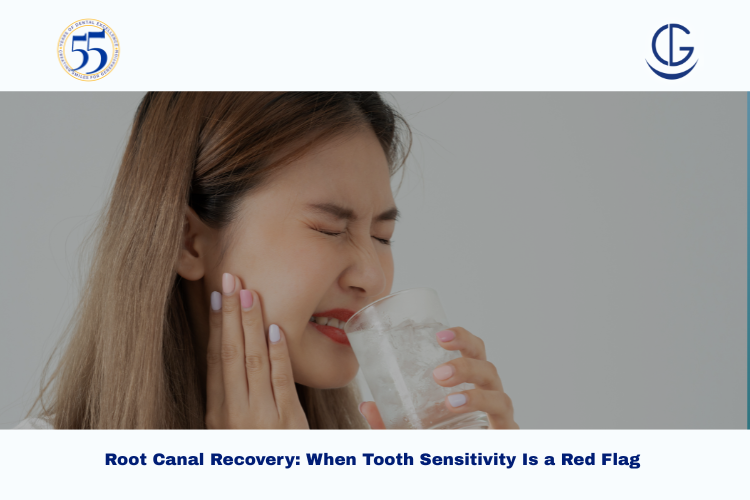Schedule Appointment



Tooth sensitivity after a root canal is a common concern for many patients. While most discomfort is temporary, persistent or worsening pain could signal an issue. At Dr Gowds Dental Hospitals in Hyderabad, we understand how important it is to know what’s normal and when it’s time to consult a professional. In this guide, we explain the causes of post-root canal tooth sensitivity, how long it usually lasts, and signs that may require further dental attention.
A root canal treatment is designed to eliminate pain caused by infected or damaged pulp inside the tooth. Although the nerve is removed during this procedure, it’s still normal to feel tooth sensitivity afterward — especially when chewing or if the surrounding area becomes inflamed.
Several reasons can explain lingering sensitivity:
The cleaning and shaping process during a root canal can irritate the tissues around the tooth’s root. This irritation may lead to temporary tooth sensitivity, especially when pressure is applied.
Sometimes, a temporary crown or filling might be slightly higher than the surrounding teeth, causing discomfort when you bite down.
In rare cases, part of the infected tissue might remain or new bacteria may enter the area, leading to renewed sensitivity.
Hairline fractures in the treated tooth can cause sensitivity to temperature or pressure even after the root canal is completed.
Most patients experience mild tooth sensitivity for a few days to a week post-procedure. This is typically managed with over-the-counter pain relievers and soft foods.
If sensitivity lasts longer than 7-10 days, worsens over time, or is accompanied by swelling or fever, it’s essential to consult your dentist immediately. At Dr Gowds Dental Hospitals, we offer comprehensive post-treatment follow-ups to ensure proper healing and comfort.
If you experience any of the following, contact your dental provider promptly:
A sensitive toothpaste like Sensodyne can help reduce discomfort. Use it twice daily for best results.
Stay away from extreme temperatures in food and beverages until the sensitivity subsides.
Ibuprofen or paracetamol can ease inflammation and reduce tooth sensitivity.
Chew on the opposite side of the treated tooth and stick to soft, gentle foods like yogurt, rice, and soups.
Continue brushing and flossing gently around the treated area to prevent additional complications.
While minor sensitivity is normal, persistent pain could mean something more serious. Visiting an experienced dental professional like Dr Gowds Dental Hospitals in Hyderabad ensures that complications are detected and treated early. Our team specializes in advanced endodontic care and patient-friendly recovery plans to make your healing journey as smooth as possible.
While post-procedure discomfort is sometimes unavoidable, the following steps can reduce risk:
Typically, mild tooth sensitivity is normal for several days after the procedure as the teeth heal and inflammation subsides.
Sensitivities typically last 3 to 7 days. If it continues longer than 10 days, talk to a dental professional.
Use a desensitizing toothpaste, stick to soft foods or foods that are not too hard or hot, and use appropriate pain medication to help with discomfort.
Pain that persists or pain that starts to get worse may indicate infection or not enough cleaning. Please reach out to your dental professional if symptoms just don’t seem to improve regardless of the cause.
Dr Gowds Dental Hospitals has been treating dental conditions like tooth sensitivity for decades, using advanced technology, and always with compassion. They are a trusted name in Hyderabad for patient care, providing you with your best chance for prevention.